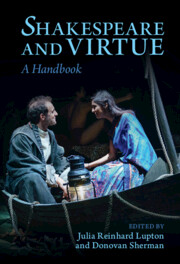Book contents
- Shakespeare and Virtue
- Shakespeare and Virtue
- Copyright page
- Contents
- Contributors
- Acknowledgements
- Introduction
- Part I Shakespeare and Virtue Ethics
- Part II Shakespeare’s Virtues
- Part III Shakespeare and Global Virtue Traditions
- Chapter 28 Shakespeare’s Rabbinic Virtues
- Chapter 29 Islamic Virtues
- Chapter 30 Persian Virtues
- Chapter 31 Buddhist Virtues
- Chapter 32 The Virtues in Black Theology
- Chapter 33 Virtue on Robben Island
- Chapter 34 Globability
- Part IV Virtuous Performances
- Works Cited
- Index
Chapter 34 - Globability
The Virtue of Worlding
from Part III - Shakespeare and Global Virtue Traditions
Published online by Cambridge University Press: 19 January 2023
- Shakespeare and Virtue
- Shakespeare and Virtue
- Copyright page
- Contents
- Contributors
- Acknowledgements
- Introduction
- Part I Shakespeare and Virtue Ethics
- Part II Shakespeare’s Virtues
- Part III Shakespeare and Global Virtue Traditions
- Chapter 28 Shakespeare’s Rabbinic Virtues
- Chapter 29 Islamic Virtues
- Chapter 30 Persian Virtues
- Chapter 31 Buddhist Virtues
- Chapter 32 The Virtues in Black Theology
- Chapter 33 Virtue on Robben Island
- Chapter 34 Globability
- Part IV Virtuous Performances
- Works Cited
- Index
Summary
If Aristotle understood virtue (aretē) to refer to the realization of a potential capacity or telos, then how might we understand the world to reach its virtuous potential? What might it mean to view our own global present as not an apex but as a passing stage within a broader process of worlding? Understanding the world as a live entity that perpetually worlds its way into new actualizations -- manifesting the dynamic capacities, potential, and striving of “virtue” -- this chapter turns to Shakespeare as a source for alternative models of world that awaken us to its inherent potentiality. For example, in As You Like It, the condition of exile unlocks a paradigm of seeing otherwise -- and often optimistically -- that runs throughout the play, enabling characters to form new bonds that serve as the basis for individual and communal flourishing. I examine the extent to which the play’s new community of relationships makes a place for nonhuman animals as well as for the pessimism and self-exile of Jaques. Such models enable us to not only see around and beyond the realities of our globalized world but also to perceive alternative formulations of world as already present and alive in the world we live in.
Keywords
- Type
- Chapter
- Information
- Shakespeare and VirtueA Handbook, pp. 334 - 346Publisher: Cambridge University PressPrint publication year: 2023
- 1
- Cited by

